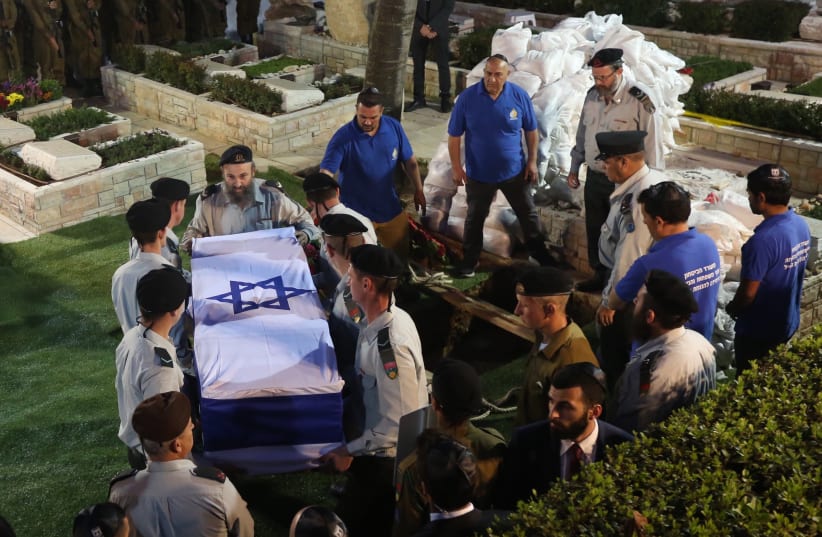Thirty-seven years ago, an unknown 21-year-old IDF soldier, Zachary Baumel, wrote a postcard to his family before heading to the battle of Sultan Yacoub: “Don’t worry, everything is fine – but it doesn’t look like I’ll be home soon.”
On Thursday evening as the sun set over Jerusalem’s Mount Herzl military cemetery, an IDF honor guard held aloft his coffin draped in a blue and white flag, as they brought the young man – who in the intervening nearly four decades had become a national and international symbol – to his final resting place in the hills of the city that had been his childhood home.
“Thirty-seven years have passed since then,” said President Reuven Rivlin as he eulogized Zachary in the cemetery. “Thirty-seven years – but today you came home. You came back to our land, our country: to Jerusalem.”
He described Baumel as “a good boy, good student, a basketball fan and a sensitive soul. You dreamed of becoming a psychologist. You even applied and were accepted for studies at the Hebrew University. But then the war broke out.”
Zachary’s friends, Rivlin said, are close to 60 years old, and some of them already have grandchildren.
“But we are burying you today,” said Rivlin. “A young soldier, just 21 years old. The battle of Sultan Yacoub in the First Lebanon War was one of the toughest the IDF has fought; a battle that left us with an open wound in our hearts.”
The IDF suffered many losses in that battle, including “the pain of the three soldiers missing in action,” he said, referencing Zachary and two other soldiers from that battle, Tzvi Feldman and Yehuda Katz.
This is the day, Rivlin said, that “we can say, with full faith, that we do everything – even the inconceivable and the unbelievable – to fulfill our oath: to bring home our soldiers who did not return from battle.
“Today we can say honestly and humbly to our soldiers past, present and future: we did not give up and we will not give up on this sacred task until all those who fell defending our people and country are brought home,” Rivlin said. “We will not cease until all our boys are back home.”
He recalled how before his death in 2009, Zachary’s father Yona had traveled all over the world to find his son, but died before he completed that mission.
“Yona, today we can finally tell you – you did not see the day, but the mission to bring Zachary home to be buried in Israel has been completed,” Rivlin said.
Prime Minister Benjamin Netanyahu, who came to the funeral just after landing back in Israel from Moscow with some of Zachary’s personal belongings, told the Baumel family that the country had fulfilled the moral debt it owed them.
“The heart aches and is broken,” Netanyahu said. “There is nothing more terrible then the pain of the bereaved – but now, at last, that wound can begin to heal.”
IDF Chief of Staff Lt.-Gen. Aviv Kochavi and Rabbi Yaakov Meidan of the Har Etzion Yeshiva where Zachary studied also delivered eulogies.
Zachary’s older sister, Osna Haberman, spoke of the mixed emotions of loss and the relief of closing a circle of uncertainty.
“All the prayers we have prayed for 37 years have now congregated in this one place,” Haberman said. “I thought: what can I do here, I can’t even hug you [Zachary]. Then I thought to turn to the earth and ask it to embrace you. Then I realized that I didn’t need to – the earth is already hugging tightly. Why? Because there is absolute love between the son who gave everything for his land and the earth itself. There is a perfect union here; you are together now.”
She thanked all those in Israel and abroad who had supported them over the years.
“You were so modest, so humble, so selfless,” Osna said. He would have been surprised by the number of people who had come to the funeral, she said. “You would have said, what is everyone doing here today, what is happening? You would not have understood.
“I would have told him, ‘yes, they have come to honor you, because you gave everything you had.’”
